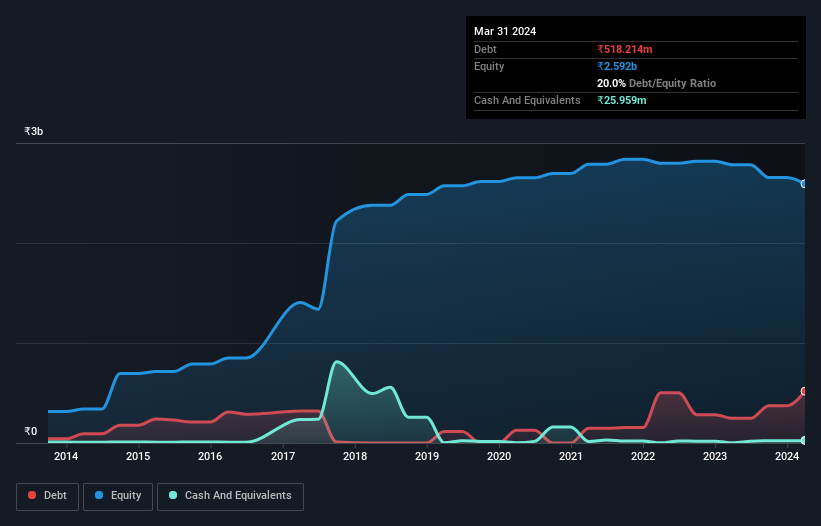AksharChem (India) (NSE:AKSHARCHEM) Is Carrying A Fair Bit Of Debt
Warren Buffett famously said, 'Volatility is far from synonymous with risk.' So it might be obvious that you need to consider debt, when you think about how risky any given stock is, because too much debt can sink a company. We can see that AksharChem (India) Limited (NSE:AKSHARCHEM) does use debt in its business. But the more important question is: how much risk is that debt creating?
Why Does Debt Bring Risk?
Generally speaking, debt only becomes a real problem when a company can't easily pay it off, either by raising capital or with its own cash flow. In the worst case scenario, a company can go bankrupt if it cannot pay its creditors. However, a more common (but still painful) scenario is that it has to raise new equity capital at a low price, thus permanently diluting shareholders. Of course, debt can be an important tool in businesses, particularly capital heavy businesses. The first thing to do when considering how much debt a business uses is to look at its cash and debt together.
Check out our latest analysis for AksharChem (India)
How Much Debt Does AksharChem (India) Carry?
The image below, which you can click on for greater detail, shows that at March 2024 AksharChem (India) had debt of ₹518.2m, up from ₹246.3m in one year. However, it also had ₹26.0m in cash, and so its net debt is ₹492.3m.

How Strong Is AksharChem (India)'s Balance Sheet?
The latest balance sheet data shows that AksharChem (India) had liabilities of ₹819.6m due within a year, and liabilities of ₹393.5m falling due after that. On the other hand, it had cash of ₹26.0m and ₹484.1m worth of receivables due within a year. So it has liabilities totalling ₹703.1m more than its cash and near-term receivables, combined.
AksharChem (India) has a market capitalization of ₹2.94b, so it could very likely raise cash to ameliorate its balance sheet, if the need arose. However, it is still worthwhile taking a close look at its ability to pay off debt. When analysing debt levels, the balance sheet is the obvious place to start. But it is AksharChem (India)'s earnings that will influence how the balance sheet holds up in the future. So if you're keen to discover more about its earnings, it might be worth checking out this graph of its long term earnings trend.
In the last year AksharChem (India) wasn't profitable at an EBIT level, but managed to grow its revenue by 8.4%, to ₹3.2b. That rate of growth is a bit slow for our taste, but it takes all types to make a world.
Caveat Emptor
Over the last twelve months AksharChem (India) produced an earnings before interest and tax (EBIT) loss. Indeed, it lost ₹55m at the EBIT level. Considering that alongside the liabilities mentioned above does not give us much confidence that company should be using so much debt. So we think its balance sheet is a little strained, though not beyond repair. Another cause for caution is that is bled ₹234m in negative free cash flow over the last twelve months. So in short it's a really risky stock. The balance sheet is clearly the area to focus on when you are analysing debt. But ultimately, every company can contain risks that exist outside of the balance sheet. These risks can be hard to spot. Every company has them, and we've spotted 2 warning signs for AksharChem (India) (of which 1 is concerning!) you should know about.
If, after all that, you're more interested in a fast growing company with a rock-solid balance sheet, then check out our list of net cash growth stocks without delay.
New: Manage All Your Stock Portfolios in One Place
We've created the ultimate portfolio companion for stock investors, and it's free.
• Connect an unlimited number of Portfolios and see your total in one currency
• Be alerted to new Warning Signs or Risks via email or mobile
• Track the Fair Value of your stocks
Have feedback on this article? Concerned about the content? Get in touch with us directly. Alternatively, email editorial-team (at) simplywallst.com.
This article by Simply Wall St is general in nature. We provide commentary based on historical data and analyst forecasts only using an unbiased methodology and our articles are not intended to be financial advice. It does not constitute a recommendation to buy or sell any stock, and does not take account of your objectives, or your financial situation. We aim to bring you long-term focused analysis driven by fundamental data. Note that our analysis may not factor in the latest price-sensitive company announcements or qualitative material. Simply Wall St has no position in any stocks mentioned.
Have feedback on this article? Concerned about the content? Get in touch with us directly. Alternatively, email editorial-team@simplywallst.com
About NSEI:AKSHARCHEM
AksharChem (India)
Manufactures and sells dyes intermediates, pigments, and inorganic chemicals in India.
Adequate balance sheet with low risk.
Similar Companies
Market Insights
Community Narratives



